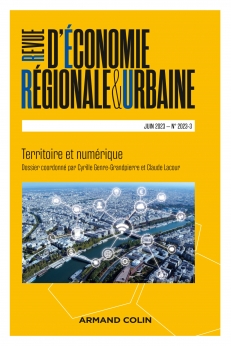
Revue d'économie régionale et urbaine (3/2023)
Pour acheter ce numéro, contactez-nous
Recevez les numéros de l'année en cours et accédez à l'intégralité des articles en ligne.
Le changement climatique entraîne une augmentation des précipitations et des températures, avec une incidence particulière sur les villes. Ces dernières connaissent une augmentation du ruissellement pluvial et des phénomènes d’îlots de chaleur urbains. Les plans locaux d’urbanisme intercommunaux (PLUi) ont la capacité de véhiculer des leviers d’adaptation au niveau local. Cependant, il n’existe pas de contenu standard pour les PLUi et les collectivités s’interrogent si leurs documents transmettent effectivement leurs intentions d’adaptation. Nous créons une démarche d’analyse de contenu, spécifiquement conçue pour le Projet d’Aménagement et de Développement Durables (PADD), une pièce clé du PLUi, afin de comprendre ses intentions d’adaptation. La première étape de la méthode, consistant en une analyse lexicométrique, a été appliquée au PADD du PLUi de Nantes Métropole. Les résultats montrent les principaux thèmes discursifs à partir desquels il est possible de formuler des inférences sur la posture adaptative de la collectivité nantaise.
Climate change leads to an increase in precipitation and temperatures. Due to the use of impervious surfaces, urban areas are experiencing an increase in rainfall runoff and urban heat island phenomena. In France, a national climate change adaptation strategy guides national adaptation objectives that must be translated into plans and programs, including inter-municipal local urban plans (PLUi in French). The PLUi have the capacity to convey levers for adaptation such as limitation of soil sealing or the use of the blue-green infrastructure as a support for stormwater management and urban cooling. However, there is no standard adaptation content for the PLUi and local authorities question about whether their documents effectively convey adaptation. We create a content analysis method, specifically designed for the sustainable development project (PADD), a key element of the PLUi as it contains the political project for the territory, in order to understand its adaptation ambitions. The case study is the Nantes metropolitan area, a territory particularly affected by floods and which recently approved its PLUi. We develop here the first step of the method which consists in a lexicometric analysis applied to the PADD corpus. The results reveal that the terms referring to the environment are the most treated by the document. However, specific themes dealing with climate change, adaptation, stormwater management or thermal comfort are statistically less prevalent. This analysis allowed us to formulate assumptions that we hope to confirm or refute through the application of the other steps of the content analysis method. We show that textual analysis can provide useful information for planners seeking to determine whether the policy direction communicated by their PADD is supportive of adaptation.